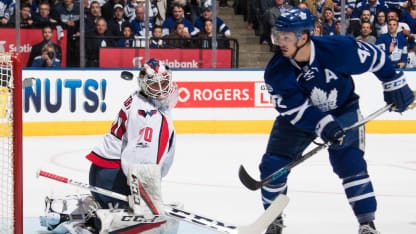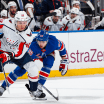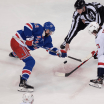During the course of an 82-game regular season in 2016-17, the Capitals lost a total of 27 games, 19 in regulation and eight in overtime. Only twice in those 27 losses did Washington fail to protect a lead of two goals.
#CapsLeafs Postgame Notebook: Leads Lost
Caps can't hold either of two two-goal leads in Game 3, inability to score on two-minute, two-man advantage is damning.

© Mark Blinch
The first time was way back on Oct. 22, when a 2-0 lead at the end of the first period morphed into a 4-2 loss to the New York Rangers at Verizon Center in the fifth game of the season. The second time was on Jan. 16 at Pittsburgh, a game in which the Caps had a 3-0 lead and scored multiple goals in all three periods, only to surrender half a dozen goals in the middle period en route to an 8-7 overtime loss.
But with the lead in their first-round playoff series with the Toronto Maple Leafs at stake on Monday night in Toronto in Game 3 of the set, the Caps frittered away leads of 2-0 in the first period and 3-1 in the second, ultimately suffering a second 4-3 overtime loss in as many games. The Leafs' win lifts them to a 2-1 series lead.
The Maple Leafs are a dynamic young team to be sure, but they're also a dynamic young team that won fewer than half (40 of 82) of its regular season games and is making its first postseason appearance in four years. The Caps are in the dance for the ninth time in the last 10 seasons, they're teeming with postseason experience, and they're driven to atone for what they viewed as too early of an exit last spring, when the Penguins ousted them in a six-game second round series.
"We know what kind of team they are," says Caps defenseman John Carlson of the Leafs. "They're skilled, and they get their chances. The more we can limit them and push them to the outside, the better off we'll be. But it's about reacting in the playoffs. It's time to react."
Every team has holes, but through three games of this first-round series, the Leafs have proven to be more adroit imposing their will on the Capitals and exploiting Washington's few weaknesses than the other way around. There's no shame in losing a playoff game, especially one early in a series. But when you finish the regular season with the league's best record and you're facing the last team to clinch its postseason berth, and when you have a two-goal lead with five minutes left in the second period only to fritter it away in those five minutes, and then you go more than 13 minutes without mustering a shot on goal in the third period of a tie game in a tied series, how does that even happen in a game of this magnitude?
"Good question," replied Caps defenseman Matt Niskanen.
The Leafs went to Washington with the goal of winning a game and taking away the home ice advantage the Capitals toiled so hard to earn from October to April. Even after Monday's ugly Game 3 loss, the Caps need only to win Wednesday night's Game 4 to regain that home ice advantage and shrink the series to a best-of-three. But the Caps are already in a position now where their season will be over if they don't win three of their next four games. A loss on Wednesday would require them to win three straight, including one in Toronto. The Capitals finished the '16-17 regular season with six wins in their last seven road games, but they have now lost four straight road playoff contests and are 4-10 in road playoff games during the Barry Trotz era.
"When we're up 3-1 we are giving the game away," laments Caps center Nicklas Backstrom. "Yeah, they got some lucky goals. But at the same time, that's hockey. Up 3-1, we shouldn't let them in the game again. But we do."
The Caps keep reminding us that they haven't played their best hockey yet in this series. We're approaching the point in the series where that is becoming more of an indictment than a crutch.
Five-On-Three Fail -Owning a 3-1 lead at 6:52 of the second period, the Caps came to another one of those killer instinct crossroads moments when the Leafs lost their discipline and left the Caps with a full two-minute, two-man advantage. Those are the moments when championship caliber teams separate themselves from the competition, and it sure seemed like a good spot for the Capitals, who scored three power-play goals on just 10 shots on net in the first two games of the series.
But the Caps could not cash in. They had all the elements - a television timeout to talk it over, a face-off win to start the sequence, virtually constant offensive-zone time, committed puck retrievals, and good looks at the opposition net. Washington mustered seven shot attempts, but only two were on net. The best chances missed altogether; there were four of those.
"We should have scored there, absolutely I think so," says Backstrom. "You've got to take advantage of that. That's on us. We're giving it away, and it's not good enough."
Even worse, the Caps got another power play less than a minute later and couldn't do anything with that opportunity, either. Instead of putting the Leafs down by three goals, the Caps lost whatever momentum they had and spent much of the rest of the night chasing the Leafs in vain, trying to get it back.
"You don't get many opportunities on the power play," says Caps defenseman Brooks Orpik. "In the second period there when we didn't score on a full two-minute five-on-three and then they had another penalty right after that for too many men. A lot of times, you don't score on the power play. But you want to make sure you don't lose momentum. I don't know if we lost momentum there, but we definitely game them in the building some energy."
So Much For The Start - Both teams got out to swift starts in their first games in the other team's barn in this series, but neither was able to earn a win that night.
Toronto owned a 2-0 lead before Game 1 was even 10 minutes old, becoming the first team in more than four years - a span of 189 home games - to come into Verizon Center and take a two-goal lead over the Caps by the middle of the first. Washington was able to rebound with a goal in the first and another in the second, and it won on Tom Wilson's first career playoff goal at 5:15 of overtime.
On Monday night in Toronto, the Caps scored on their first two shots on goal of the game, and their top offensive players - Backstrom and Alex Ovechkin - scored those goals. The first one was scored at four-on-four; the Caps didn't score a four-on-four goal at any point during the regular season. It's the start the Caps had been looking for all series, but it wasn't enough.
"I thought we came out great," says Caps coach Barry Trotz. "The first 14 minutes, I thought we had them on their heels. It's a little different playing at home. They got a goal [in the first] and the crowd got into it, but I liked our first period.
"Second period, we were fine. We were doing a lot of good things. Up 3-1 and we have that five-on-three, and there is a chance to take control of the game, and we didn't. And we had another power play opportunity, and we didn't do it. And then they got some momentum."
After failing to score on the five-on-three and the other power play that followed, Washington surrendered a goal on Toronto's very next shot on goal, making it a 3-2 game.
Worse, the Caps were guilty of inexcusably soft coverage in their own end of the ice with Toronto's top forward trio on in the final minute of the period, and that's when Washington's lead evaporated for good. William Nylander had two cracks at Washington's net from the top of the paint, and after Holtby stopped the first shot, Nylander calmly collected his own rebound, moved to a slightly better shooting angle and potted what was virtually an empty-net goal.
"We were able to stabilize," says Trotz, and [Evgeny Kuznetsov] had a great chance - had [Leafs goalie Frederik] Andersen down and out with about four minutes to go - and he put it over the net. And then obviously they got that [third goal]. The last minute, we can't give up a goal. We end up giving up that chance with less than a minute to go. That just can't happen."
The Leafs out-attempted the Capitals 40-20 over the final 30 minutes of playing time, which should never happen given the stakes of the game and the series at that point.
"In the third period," says Trotz, "they got some momentum from that; the crowd is into it and they were coming hard. I thought we managed it, but we didn't generate anything until towards the end of the period. They're capitalizing on their moments, and we're not. In the series, they've had opportunities and they've cashed in. We've had opportunities and we haven't cashed in, to this point. It doesn't mean it can't happen next game."
Missing Iron Man -Caps defenseman Karl Alzner missed Monday's Game 3 with an upper body injury, the first game he has missed in seven years. Alzner had played in 540 consecutive regular season games and he also had a streak of 59 straight playoff games, too.
Nate Schmidt filled in more than capably, setting up Backstrom's goal with an excellent play on his second shift of the night. He finished the game with two hits and two blocked shots in 16:29 of ice time.
Trotz says Alzner is day-to-day, but the veteran blueliner is not expected to play in Wednesday's Game 4.
Senses Working Overtime - The Caps have played three straight overtime playoff games for the first time in more than two decades. The last time the Caps played three straight games beyond 60 minutes in the same playoff series was in Games 2-4 of their first-round series with the New York Islanders in 1993. The Caps lost all three of those overtime games and ultimately lost the series as well, in six games.
According to Elias Sports Bureau, Monday night marked just the third time in NHL Stanley Cup Playoff history that there were four overtime games on the same night. There were also a quartet of four overtime games on April 11, 1980 and April 10, 1985. Washington won over the Islanders on 4/10/85, getting an Alan Haworth goal to down the Isles in Game 1 of that best-of-five set at the Capital Centre.
By The Numbers -The Caps are now just 7-5 in the dozen playoff games in which both Backstrom and Ovechkin have scored. All five of those losses were suffered in overtime … The Caps are 11-17 in playoff overtime games in the Ovechkin era … Niskanen led the Caps with 24:40 of ice time and five blocked shots … Ovechkin led the Caps with five shots on net and seven shot attempts … Backstrom won 14 of 23 draws (61 percent).


















